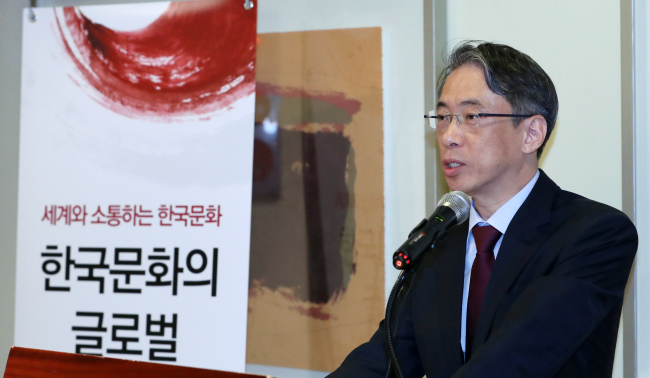In a bid to further spread Korean pop culture throughout the world, Korea will seek cultural exchanges with other countries, including members of ASEAN and CIS, the state-run agency promoting Korean culture said Monday.
Korean Culture and Information Service announced its strategies aimed at boosting Hallyu or Korean Wave, referring to the popularity of Korean entertainment and culture in other parts of the world.
 |
Director of Korea Culture and Information Service Kim Tae-hoon speaks during a press conference on Monday in Seoul. (Korean Culture and Information Service) |
The plan consists of three major categories: spreading Hallyu through diversification in regions, coordinating cooperation among government agencies to help support the spreading of Korean cultural content in all sectors and fostering overseas Korean culture centers.
The KOCIS plans expanding cooperation with neighboring countries, namely celebrating anniversaries of Seoul’s diplomatic ties with ASEAN countries with cultural exchange. Korea will mark the 70th anniversary of ties with the Philippines next year, the 60th with Malaysia in 2020 and 30th with Vietnam in 2022, and these years have been designated the “year of cultural exchange” with the respective countries.
The culture center in Indonesia and other countries will see expanded functions while Malaysia will see a new center built.
Korea will reach beyond Asia to the Commonwealth of Independent States as well, promoting Korean culture in the countries namely by marking 2020 for cultural exchange between Russia and Korea, creating a culture center in Uzbekistan.
The “Feel Korea” project will introduce Korean culture in Russia, ahead of the World Cup in June.
Language and Korean culture experience are also part of the plan. Seoul government aims to increase the number of foreigners attending the Sejong Institutes from the current 60,000 to 90,000 by 2022, and increase the “Sejong Culture Academy” programs -- hands-on experience for foreigners on Korean culture – from the existing 15 to 50.
The KOCIS will seek assistance of big data for its strategies in the future, spending 10.4 billion won ($9.7 million) in creating the data analysis system on responses from 10 countries on culture, art, travel and other Korean content to predict the demand for each category according to different regions.
In addition to pop culture, the KOCIS will seek to boost interest in art, performance, literature and other sectors.
Seoul International Writers‘ Festival, which invites local and international writers under a different theme every two years, will become an annual festival starting this year and a book introducing art works in Korea will be published by the Korean Arts Management Service.
By Yoon Min-sik
(
minsikyoon@heraldcorp.com)








